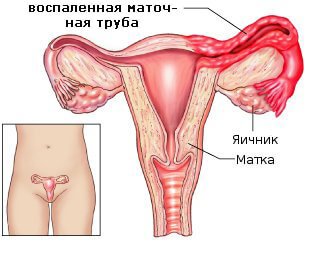Adnexitis - is any inflammatory process of the uterine appendages (tubes, ovaries). A synonym is salpingo-ovarite. This disease is very common. Mostly young women from 20 to 25 years old who lead an intense sex life suffer from it. The approximate share of adnexitis is 30% of all gynecological diseases.
Causes of adnexitis
Adnexitis can occur in the postpartum period, a few weeks after birth. The cause of the inflammatory process is staphylococcus, streptococcus, gonococcus, mycobacterium tuberculosis (isolated cases) and chlamydia. Bacteria usually spread through the blood or lymph, and can reach the ovaries even through the mucous membrane of the uterus. Adnexitis can become a factor provoking spontaneous abortion (miscarriage).
The interaction of bacteria aggravates the disease: for example, gonococcus, initiates excessive exudation into the lumen of the tube, which in turn contributes to the invasion of other microorganisms there.
Types of adnexitis
Adnexitis can be acute, subacute, or chronic. In the acute course of the disease, a sudden severe pain occurs between the lower abdomen and the lumbosacral region. In addition, acute adnexitis is characterized by a feeling of tension in the abdominal muscles, which leads to menstrual irregularities and pain during intercourse. Acute adnexitis can be the cause or consequence of cervicitis, endometritis. «The trinity» of pathological processes - adnexitis, cervicitis and endometritis - are closely interconnected, leading to copious discharge and febrile conditions.
Due to the inflammatory process, the structure of the fallopian tubes undergoes significant deviations: its volume increases, the lumen is filled with serous or purulent exudate. Thus, the infection spreads to the ovaries and peritoneum.
If adnexitis is not treated, it becomes chronic, characterized by subfebrile body temperature, vaginal discharge, loss of appetite, and general malaise. From the point of view of morphology, a chronic inflammatory process in the fallopian tubes causes swelling and deformation, resulting in adhesions.
In a general sense, a typical set of symptoms of chronic adnexitis is not very different from acute. Observations show that exacerbation of symptoms is noted after physical exertion, before menstruation. Due to chronic adnexitis, infertility may develop due to adhesions in the ovaries, uterus and peritoneum.
Treatment of adnexitis
Therapy of the disease is primarily aimed at eliminating the pathogenic factor that caused the inflammatory process. It is advisable to use antibiotics, to which this type of microorganism is most sensitive. SPA treatments also have a positive effect. If you began to be disturbed: fever, discharge, pain in the lower abdomen, nausea, contact our specialists .right away
















